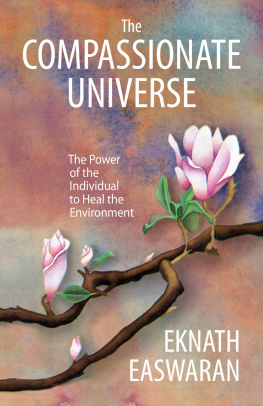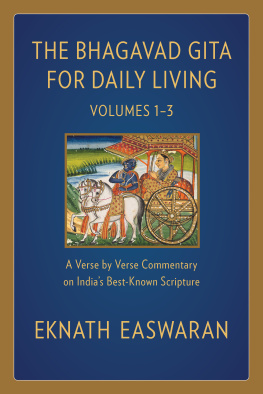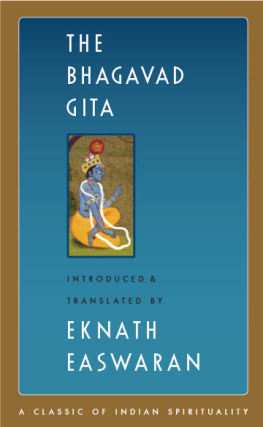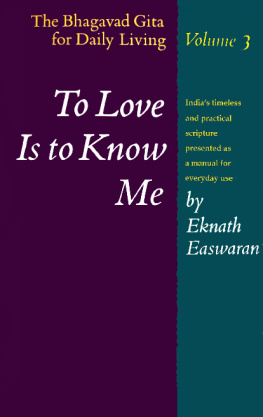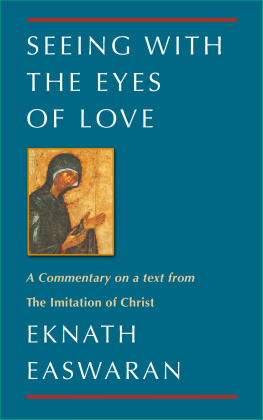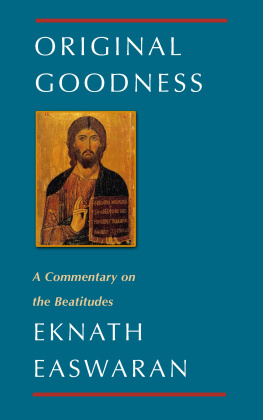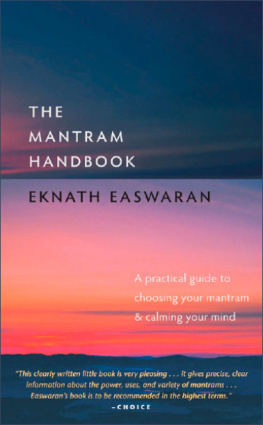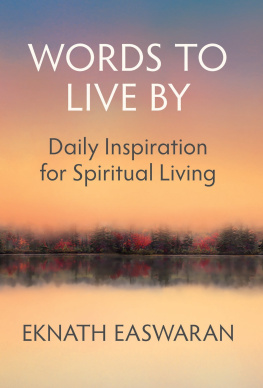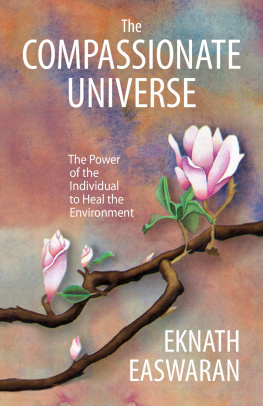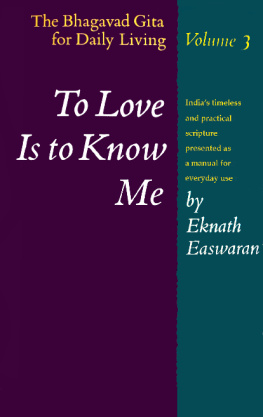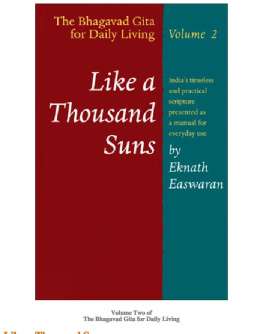
The Compassionate Universe
The Power of the Individual to Heal the Environment
eknath easwaran

1989, 2022 by the Blue Mountain Center of Meditation
All rights reserved.
Second edition, first printed 2022
ISBN 9781586381486 (paperback)
ISBN 9781586381509 (hardcover)
ISBN 9781586380595 (ebook)
Table of Contents
introduction A New Era
No man is an island, entire of itself; every man is a piece of the continent, a part of the main.
John Donne
I will never forget the day I came home from school and told my grandmother what I had learned in geography class. In our small South Indian village, my grandmother was deeply respected and loved. I could not imagine anyone wiser, yet she had never been to school or learned to read, or even traveled more than a few miles from our village. So when she met me at the gate, as she did every day, and asked me what I had learned in school, I was a bit hesitant to tell her the subject of the days lesson. Apparently it was something every schoolboy should know and accept without difficulty. To me it was a catastrophe.
Granny, I began with considerable agitation, scientists have discovered that our village is nothing but an anthill compared with the sun. As always, she listened carefully to everything I had to say. I told her about the vastness of outer space, the tremendous distances between planets, and the terrible smallness of the world that had up to then been my universe: our village, the nearby forest, the Blue Mountain on the horizon. My teacher says we are just insignificant specks in the universe, Granny. We dont matter at all.
Generally, my grandmother spoke very little, but her presence communicated a tremendous security. She said nothing now. Calmly, she opened the gate, put her hand on my shoulder, and walked inside with me.
We sat down, and it was a while before she spoke. No one is insignificant, son, she said finally. Have you ever looked at Hastis eyes? Hasti was one of the elephants that frequently served in our religious ceremonies and that I had been learning to ride. Hastis eyes, like the eyes of all elephants, were tiny ridiculously small, really, for an animal so huge. She has no idea how big she is, Granny said, because she looks out at the world through such tiny eyes.
At the time, Grannys words went right over my head. It was not until much later, after many years and much seeking and questioning, that I began to understand why she answered me the way she did and why she lived the way she did. That search, and the understanding I eventually reached, are the subject of this book. I have come to believe that her answer, and the comprehensive vision of human nature it was based on, have a great deal to offer the world at this critical period in history, as it becomes clear that our present way of life is endangering not only our own health and well-being but that of the earth itself.
My grandmother lived in a universe filled with life. It was impossible for her to conceive of any creature even the smallest insect, let alone a human being as insignificant. In every leaf, flower, animal, and star she saw the expression of a compassionate universe, whose laws were not competition and survival of the fittest but cooperation, artistry, and thrift.
Not that she talked about any of this; it was simply the way she lived and thought. Indeed, few of us in that small South Indian village could even have begun to express this idea verbally. None of us lived up to the example my grandmother set, but we all trusted and looked up to her. In our way of life, our farming, our business and barter, our friendships, we were guided by her ideal of an individual life rooted in continuous harmony with life as a whole.
In every aspect, life in our village was very close. Our lives had been woven together through centuries of depending on each other. If my mother wanted a new pot, she would send for the village potter, whose family had been making pots for my family for centuries, and he would turn out just what she wanted. If my cousins needed new jewelry, they would call on the village goldsmith, who would come and fashion earrings for them right on the veranda of our house, just as his father and grandfather had done.
We traveled little, since everything we needed was right there in the village. I received my elementary school education, for instance, on the veranda of our ancestral home. Our homes were built of bricks made in the village and teak from the nearby forest, and for entertainment we were often visited by some of the finest South Indian classical dance, music, and drama troupes.
Agriculturally as well, we were self-sufficient. Our crop yields were not astonishing, but they were substantial, and for centuries our traditional method of farming, based on the rhythms of nature, natural pest control, and natural fertilizers, had enriched the soil. Following Grannys example, we tried to treat every part of nature with love and respect. The earth was our home, she would have said, but no less was it home to the oxen that pulled our plows or the elephants that roamed in the forest and worked for us. They lived with us as partners whose well-being was inseparable from our own.
But I think it was in times of mourning and celebration that we understood just how deeply our lives were intertwined. A death or birth in any family touched us almost as deeply as if it affected our own kin. Much later, when I came to read John Donne, I recognized the life of our village in his lines: No man is an island, entire of itself; every man is a piece of the continent, a part of the main; if a clod be washed away by the sea, Europe is the less, as well as if a promontory were, as well as if a manor of thy friends or of thine own were; any mans death diminishes me, because I am involved in mankind; and therefore never send to know for whom the bell tolls; it tolls for thee.
Because of these enduring bonds, we had no need for some of the impersonal institutions that have become essential in industrial society, like life insurance and social security. Instead we had families and friends who were ready to help in any circumstance. Within such an atmosphere, there was little or no crime; in fact, I never even saw a policeman until I went away to college.
Of course, we did not live in an ideal world. In a prosperous village like ours there was little poverty, but diseases like cholera and smallpox were not uncommon. It is not that no one was ever hurt, or that people never quarreled or manipulated each other; but when such things happened, we knew quite clearly that they were discordant, that they did not fit in with the way life should be. It was not an ideal world, but it was a world with an ideal.
My grandmother embodied this ideal, and the depth of her commitment to it helped all of us to find it in ourselves. Cooperation, artistry, thrift, and compassion: my grandmother saw these laws at work everywhere, and they were the foundation of everything she did. That is why my geography teachers comment must have seemed a little ridiculous to her. Our significance as human beings was not a philosophical issue or a matter for intellectual debate. It was a daily, continuous experience, more real than anything else.
You might think my grandmother lived in a state of blessed innocence, untouched by the worlds problems. True, she did not read newspapers, and she knew nothing about physics or chemistry, but in the give-and-take of daily life she showed a wisdom and loving authority that never altered, even when she was faced with severe trials. I remember her sitting for days nursing cholera victims, whom all the other villagers were afraid to come near, without a trace of fear or despair, always secure in her compassion. And many times she kept the traditional all-night vigil with the body of a relative who had just died a tremendous act of love for the rest of us, who wanted the vigil kept but were afraid to set foot in the room reserved for the corpse.
Next page
